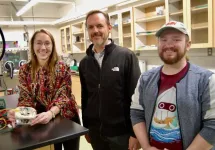(Press-News.org) ABSTRACTS CT037, CT038, CT042
SAN DIEGO – Three early-phase clinical studies presented by researchers from The University of Texas MD Anderson Cancer Center at the American Association for Cancer Research (AACR) Annual Meeting 2024 show promising initial data for patients with lymphoma, gastric or gastroesophageal junction cancers, and specific molecularly selected tumors. The studies were featured in a clinical trials minisymposium highlighting novel agents and emerging therapeutic strategies. Information on all MD Anderson AACR Annual Meeting content can be found at MDAnderson.org/AACR.
Novel combination with evorpacept demonstrates promising results for patients with B-cell non-Hodgkin lymphoma (Abstract CT037)
Data from an investigator-initiated Phase I trial of the novel CD47 blocker evorpacept (ALX148) in combination with lenalidomide and rituximab (R2), presented by Paolo Strati, M.D., assistant professor of Lymphoma and Myeloma, showed promising early results for patients with relapsed or refractory B-cell non-Hodgkin lymphoma.
While historical complete response rates (CRRs) with R2 monotherapy are 30%, the new combination achieved an 80% CRR with an overall response rate of 90%. After a median follow-up of 16 months, the one-year progression-free survival rate was 70% and one-year overall survival rate was 90%.
Previous work from Strati demonstrated that specific white blood cells known as SIRPα+ macrophages may mediate resistance to the R2 combination, leading to the hypothesis that adding evorpacept to the R2 combination could have synergistic results. Blocking CD47 prevents the ‘don’t eat me signal’ that results from the interaction of SIRPα and CD47.
“The addition of evorpacept to R2 seems to significantly increase the efficacy of these therapies, with no synergistic toxicity, in patients with indolent B-cell lymphomas,” Strati said. “We look forward to continuing studies with this novel combination in order to bring effective options to our patients in need.”
The trial included 20 patients with four different types of B-cell non-Hodgkin lymphoma, 18 of whom had indolent, or slow-growing, disease. All patients previously received an anti-CD20 monoclonal antibody, and 73% received prior chemotherapy.
The most common grade 3 or higher adverse events were consistent with those typically seen with R2 therapy, such as neutropenia, infections, elevated liver enzymes, skin rash and anemia, and were not increased by the addition of evorpacept. No dose-limiting toxicities were observed, and the recommended Phase II dose was identified.
A Phase II study investigating the efficacy of this combination in previously untreated patients is now enrolling.
This study was funded by ALX Oncology, the Leukemia & Lymphoma Society Scholar in Clinical Research Award, the Gilead and Kite Scholar Award and the Andrew Sabin Family Fellowship Program. A full list of collaborating authors and their disclosures can be found here.
Antibody-drug conjugate SKB264 shows potential for durable responses in heavily pretreated patients with advanced gastric or gastroesophageal junction cancers (Abstract CT038)
Preliminary data from a Phase I/II study evaluating the antibody-drug conjugate (ADC) SKB264, presented by Jordi Rodon, M.D., Ph.D., associate professor of investigational cancer therapeutics showed that pretreated patients with gastric or gastroesophageal junction cancers could have durable responses and potentially longer overall survival with SKB264 monotherapy.
Of the 41 patients able to be evaluated for response, SKB264 achieved an objective response rate of 22%, a disease control rate of 80.5%, and a median duration of response of 7.5 months.
“It is interesting to note the change in antitumor activity and safety profile that results from changing payloads and linkers, even among ADCs aiming at the same target,” Rodon said. “One of the big results of this trial is that, by using a different linker-payload combination, we did not see the interstitial lung diseases associated with other ADCs.”
SKB264 is an ADC that targets TROP2, a factor associated with poor prognosis in advanced gastric cancers. It uses a novel linker to connect the antibody with the payload, a belotecan-derivate topoisomerase I inhibitor.
Forty-eight patients were evaluable for safety, with a follow-up of at least nine weeks at the data cutoff. All received previous therapy, with 50% having received multiple prior lines of therapy. Treatment-related adverse events higher than grade 3 were seen in 52.1% of patients, with the most common being anemia, decreased white blood cell or neutrophil counts, and neutropenia. Only 18.8% of patients had to decrease dosage, and 33.3% had to delay dosing due to adverse events. No adverse events led to discontinuation of the trial or death.
Based on these results, a Phase III global study currently is being planned to evaluate SKB264 in comparison to the current standard of care in patients with at least three prior lines of therapy in gastric or gastroesophageal junction adenocarcinomas.
This study was funded by Klus Pharma and Merck & Co. (MSD). A full list of collaborating authors and their disclosures can be found here.
Combining PARP and PI3K inhibitors shows encouraging results in Phase Ib trial for molecularly selected patients (Abstract CT042)
Results from a biomarker-driven, tumor-agnostic Phase Ib trial of copanlisib plus olaparib showed the combination was safe and well tolerated, with a clinical benefit in 36% of molecularly selected patients who had advanced cancers harboring PIK3CA hotspot, PTEN, or DNA damage response (DDR) mutations.
Trial results were presented by Timothy Yap, M.B.B.S., Ph.D., professor of Investigational Cancer Therapeutics, and vice president and head of clinical development in the Therapeutics Discovery division.
Of 22 patients able to be evaluated for efficacy, six achieved partial responses and two achieved stable disease for at least six months. Notably, a patient with advanced triple-negative breast cancer with PIK3CA H1047R, PTEN and ARID1A mutations achieved a confirmed radiological partial response and was on trial for 42 months with minimal side effects.
Preclinical studies had shown potential for the combination of PI3K and PARP inhibition in cancers with DDR and PI3K pathway alterations, prompting this investigator-initiated trial conducted through National Cancer Institute Cancer Therapy Evaluation Program (NCI CTEP), which partnered the pan-PI3K inhibitor copanlisib with the PARP inhibitor olaparib.
The trial enrolled 28 patients, representing 12 cancer types and 11 mutation types. Ten patients had more than one qualifying mutation. This was a heavily pretreated patient population, with 61% having received three or more prior lines of therapy. The combination was safe and generally well tolerated, with the most common adverse events of any grade being mucositis, nausea, diarrhea and vomiting.
“We observed promising antitumor activity in patients with a range of cancers with different DDR and/or PI3K pathway alterations, which may serve as novel predictive biomarkers of response,” Yap said. “Comprehensive translational analyses of longitudinally collected patient samples from the clinical trial are currently ongoing.”
This study was funded and sponsored by the National Cancer Institute, part of National Institutes of Health. MD Anderson led the study with participation from the NCI Experimental Therapeutics Clinical Trials Network (ETCTN) (4UM1CA186688-07). AstraZeneca Pharmaceuticals and Bristol-Myers Squibb Company provided support to this study through Cooperative Research and Development Agreement between NCI and each company. A full list of collaborating authors and their disclosures can be found here.
END
AACR: Trio of studies highlights promising early results with new cancer therapies and targets
MD Anderson researchers share clinical data from novel combinations, a new antibody-drug conjugate and a trial of molecularly selected patients
2024-04-10
ELSE PRESS RELEASES FROM THIS DATE:
When should a surgeon plan for a career shift? New guidelines uphold lifelong competency of surgeons
2024-04-10
As millions of Americans approach age 66, they face the inevitable question, is it time to retire? The physician population is aging alongside the general population – more than 40% of physicians in the U.S. will be 65 years or older within the next decade. In the case of surgeons, there is little guidance on how to best ensure their competency throughout their career and at the same time maintain patient safety while preserving physician dignity.
In a current study published in the Journal of the American College of Surgeons, the American College of Surgeons (ACS) ...
Survival rates after hip or spine fracture worse than for many cancers
2024-04-09
A new article in JBMR Plus, published by Oxford University Press, indicates that patient survival rates after hip or other bone fractures can be very poor. While patients and their families may dismiss a fracture as a minor injury, survival rates can be lower than those for many types of cancer.
Scientists have gathered a body of evidence about mortality outcomes in patients over 50, but survival rates following bone fractures are not often included in the statistics available to patients or caregivers. The aim of this ...
Beating back bitter taste in medicine
2024-04-09
PHILADELPHIA (April 9, 2024) – The bitter taste of certain drugs is a barrier to taking some medications as prescribed, especially for people who are particularly sensitive to bitter taste. Published in Clinical Therapeutics, a team from the Monell Chemical Senses Center found that the diabetes drug rosiglitazone could partially block the bitter taste of some especially bad-tasting medications. Rosiglitazone could be added in small doses to other medicines, to make them less bitter and taste better.
This result provided new information. “To our knowledge, there are no previous reports on the bitter-blocking effect of this diabetes drug,” ...
Heart regeneration pioneer to join UW–Madison, Morgridge Institute
2024-04-09
04/09/2024
CONTACT: Deneen Wellik, wellik@wisc.edu
Heart regeneration pioneer to join UW–Madison, Morgridge Institute
MADISON — A biologist who explores the potential life-saving mechanisms of how organisms regenerate damaged heart and spinal cord tissue will join the University of Wisconsin–Madison and the Morgridge Institute for Research this fall.
Kenneth Poss, presently the James B. Duke Professor of Regenerative Biology at Duke University, explores a research area that has grown ...
Can the bias in algorithms help us see our own?
2024-04-09
Algorithms were supposed to make our lives easier and fairer: help us find the best job applicants, help judges impartially assess the risks of bail and bond decisions, and ensure that healthcare is delivered to the patients with the greatest need. By now, though, we know that algorithms can be just as biased as the human decision-makers they inform and replace.
What if that weren’t a bad thing?
New research by Carey Morewedge, a Boston University Questrom School of Business professor of marketing and Everett W. Lord Distinguished Faculty Scholar, found that people recognize more of their biases in algorithms’ decisions ...
This device gathers, stores electricity in remote settings
2024-04-09
Today wirelessly connected devices are performing an expanding array of applications, such as monitoring the condition of engines and machinery and remote sensing in agricultural settings. Systems known as the “Internet of Things” (IoT), hold much potential for improving the efficiency and safety of the equipment.
Yet stumbling blocks remain for IoT, thwarting many potential applications. How do you power these devices in situations where and when reliable electrical sources are not practically available?
Research from the University of Utah’s College of Engineering points to a possible solution in the form of a novel type of battery called ...
AACR: Video educates and connects men to prostate cancer screening options
2024-04-09
SAN DIEGO – As part of a comprehensive effort to improve cancer screenings among diverse communities, Penn Medicine’s Abramson Cancer Center (ACC) Community Outreach and Engagement team developed a culturally sensitive educational video to address prostate cancer screening disparities. In findings shared today at the American Association for Cancer Research (AACR) Annual Meeting 2024 (Abstract LB371), the team showed that the video increased knowledge about prostate cancer and screening, and reduced uncertainty about obtaining prostate ...
Culturally sensitive video targeting Black men may help increase awareness about prostate cancer
2024-04-09
SAN DIEGO – A video designed to educate Black men about prostate cancer resulted in 97% of surveyed participants acknowledging that Black men are at a higher risk of this disease and 93% saying they would get screened, according to a study presented at the American Association for Cancer Research (AACR) Annual Meeting 2024, held April 5-10.
Black men have the highest incidence of prostate cancer in the United States with 184.2 new cases per 100,000 people compared to white men with 111.5 new cases per 100,000 people, according to the National Cancer Institute’s Surveillance, ...
St. Jude survivorship portal brings researchers ‘one-click’ away from discovery
2024-04-09
(MEMPHIS, Tenn. – April 9, 2024) Scientists from St. Jude Children’s Research Hospital today announced the St. Jude survivorship portal — the first data portal for sharing, analyzing and visualizing pediatric cancer survivorship data. Details on the portal and its ability to facilitate breakthroughs in pediatric cancer survivorship research were published today in Cancer Discovery, a journal of the American Association for Cancer Research.
The survivorship portal is a big-data platform that incorporates clinical and genomic information, creating an unprecedented research system. The portal integrates three dimensions ...
System uses artificial intelligence to detect wild animals on roads and avoid accidents
2024-04-09
Just as in Brazil drivers can be warned of traffic congestion ahead or a vehicle parked on the hard shoulder, notifications may soon pop up on their smartphone or on their car’s computer screen to warn them in real time that an anteater, wolf or tapir is crossing the highway. No human will necessarily need to see the animal in question or press a control button to send the warning.
For this to be possible, a key step is construction of a computer vision model that automatically detects Brazilian wild animals. Researchers ...
LAST 30 PRESS RELEASES:
Brainwaves of mothers and children synchronize when playing together – even in an acquired language
A holiday to better recovery
Cal Poly’s fifth Climate Solutions Now conference to take place Feb. 23-27
Mask-wearing during COVID-19 linked to reduced air pollution–triggered heart attack risk in Japan
Achieving cross-coupling reactions of fatty amide reduction radicals via iridium-photorelay catalysis and other strategies
Shorter may be sweeter: Study finds 15-second health ads can curb junk food cravings
Family relationships identified in Stone Age graves on Gotland
Effectiveness of exercise to ease osteoarthritis symptoms likely minimal and transient
Cost of copper must rise double to meet basic copper needs
A gel for wounds that won’t heal
Iron, carbon, and the art of toxic cleanup
Organic soil amendments work together to help sandy soils hold water longer, study finds
Hidden carbon in mangrove soils may play a larger role in climate regulation than previously thought
Weight-loss wonder pills prompt scrutiny of key ingredient
Nonprofit leader Diane Dodge to receive 2026 Penn Nursing Renfield Foundation Award for Global Women’s Health
Maternal smoking during pregnancy may be linked to higher blood pressure in children, NIH study finds
New Lund model aims to shorten the path to life-saving cell and gene therapies
Researchers create ultra-stretchable, liquid-repellent materials via laser ablation
Combining AI with OCT shows potential for detecting lipid-rich plaques in coronary arteries
SeaCast revolutionizes Mediterranean Sea forecasting with AI-powered speed and accuracy
JMIR Publications’ JMIR Bioinformatics and Biotechnology invites submissions on Bridging Data, AI, and Innovation to Transform Health
Honey bees navigate more precisely than previously thought
Air pollution may directly contribute to Alzheimer’s disease
Study finds early imaging after pediatric UTIs may do more harm than good
UC San Diego Health joins national research for maternal-fetal care
New biomarker predicts chemotherapy response in triple-negative breast cancer
Treatment algorithms featured in Brain Trauma Foundation’s update of guidelines for care of patients with penetrating traumatic brain injury
Over 40% of musicians experience tinnitus; hearing loss and hyperacusis also significantly elevated
Artificial intelligence predicts colorectal cancer risk in ulcerative colitis patients
Mayo Clinic installs first magnetic nanoparticle hyperthermia system for cancer research in the US
[Press-News.org] AACR: Trio of studies highlights promising early results with new cancer therapies and targetsMD Anderson researchers share clinical data from novel combinations, a new antibody-drug conjugate and a trial of molecularly selected patients







